How did you become involved in the production?
I became involved in following . Whilst the latter was being filmed, and l from Mammoth Screen and Hilary Strong from asked me if I wanted to read a very short story called . When I read the short story it felt like the most perfect Film Noir for 1920s London, and, like the famous Noir of post WWII America, there is an incredible focus on the context of the times and how that might lead someone to commit a terrible murder.
Watch the trailer
What are the challenges given that it’s such a short story?
The main challenge is it’s a short story and it’s only about twenty pages long. But the main challenge is also the thrill of it. Within the short story you’ve got tiny little references to details about their life. Tiny, tiny little things. In the book, there’s a tiny detail about John Mayhew (played by Toby Jones) having a cough; a little dry cough that his wife says is just a habit and neither the wife nor the cough are really mentioned again. But when you’re expanding on a story you pick up on those details and you build a world around them. Similarly you find details about where they are in history.
This story was written five or six years after World War I so you pick up that detail and weave an entire world around it. So in fact the main challenges are what I like best: it’s the thing that I enjoy the most because you can be really creative and bring yourself to a story. It’s next level adaptation because you’re really taking it onwards.
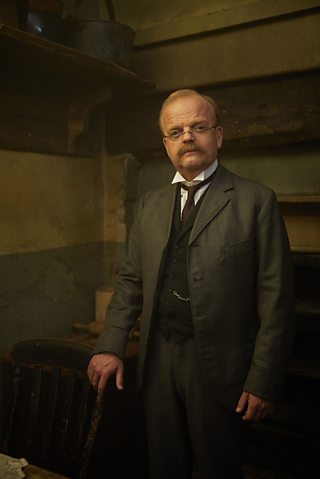
John Mayhew (Toby Jones)(Photo: Milk/±«Óãtv)
What excites you about this particular period in history?
And Then There Were None was set literally at the brink of the Second World War and is just five years after the end of the First World War. I’d done a lot of work on the First World War, the period leading up to it and the period after it. When you think about the 1920s you think about the roaring Twenties, shingled hair, and decadence, depravity, champagne short skirts and wealth. You think of the craziness of those times but the absolute truth was that was only a minority of people; the majority of people coming out of the War were absolutely impoverished. There was a terrible depression.
People came home from World War I having been through hell, only to arrive back to hell. There was very little work, people starved, people sold their medals, people pawned their medals, people begged on the streets. There was a very common thing where you’d walk along a street and there would be limbless veterans begging for pennies. People were starving.
Some people were doing great, some people were putting their cigarettes out in a beautiful estate, some people were pouring champagne down their neck like there was no tomorrow; there was almost an end of Empire feeling about it.
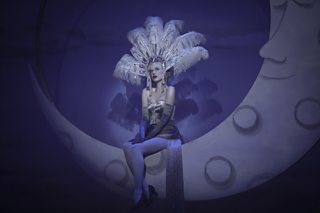
Romaine Heilger (Andrea Riseborough) (Photo: Robert Viglasky/±«Óãtv/Mammon Screen/Agatha Christie Productions)
When you put those things together, especially around a hugely notorious and highly sexually charged murder trial then you’ve got something really exciting. You’ve got so many motives and you’ve got a real sense of these people being embedded in their time.
One of the things that really excites me about working on Agatha Christie adaptations is they are murder mysteries, murder thrillers, psychological thrillers but they’re also very much about their time. They’re not trying to be specifically historical but they are. There’s a universality to them and they are specifically about the pressures of a particular time that might lead somebody to commit a murder.
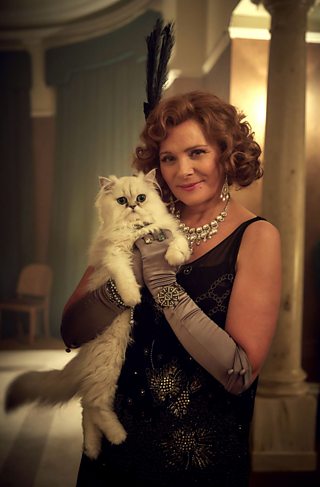
Emily French (Kim Cattrall) (Image: Robert Viglasky/±«Óãtv/Agatha Christie Productions/Mammoth Screen)
When it comes to writing are you naturally self-disciplined?
I’ve been doing this for quite a while now and there’s nothing like the ticking clock of a deadline approaching to make you disciplined. To be perfectly honest, if I’ve got a deadline I don’t actually notice what’s going on around me very much, it’s that level of discipline. You have to get to your desk, you have to work, you can’t be distracted by ; you have to make yourself do it. When you’ve become completely immersed in your work, your own world sort of falls away a bit. You become so involved that those characters become more real to you than people who are actually real. That is a form of discipline as it’s my job to tell their story.
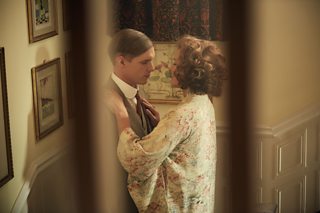
Leonard (Billy Howle), Emily French (Kim Cattrall) (Image: Milk/±«Óãtv)
Why do you think Agatha Christie stories work so well for film and television?
Agatha Christie works well for film and television because the stories are twisted and great. When I came to And Then There Were None I’d never read an Agatha Christie story, they just weren’t in my house growing up. I’d never read any of her stories until I read that book and I was profoundly shocked by it.
I know the TV adaptations of Miss Marple, and Poirot; it’s all delicious, bitchy and glorious and you’ve got the great and the good of stage and screen wearing gorgeous costumes. But the undertow of it is it’s really great entertainment. With some of the Marple and the Poirot shows we’re used to seeing, you’re in a very safe place; here’s the murder, here’s the plot and here’s the person who’s going to unravel it. It’s very satisfying. You’ve got something that’s brilliantly produced, well plotted with glorious people playing it, it’s entertaining and a beautiful thing to watch. You feel very embraced by it.
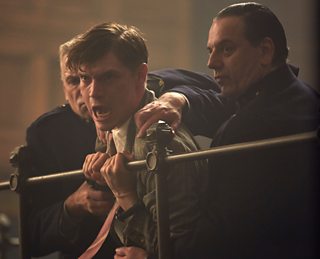
Leonard (Billy Howle) (Photo: Milk/±«Óãtv)
My take on it [Agatha Christie], and one of the reasons I find it really satisfying to write for the small screen, is that the stories are dark. One of the really shocking and extraordinary things with And Then There Were None, as with The Witness for the Prosecution, is that there’s a really strong sense that to murder someone and to take their life is to tear a hole in the universe. The world itself changes and you are changed profoundly through your association with this terrible event. What I like is to take this general perception of knowing where you are with ‘cosy Christie’ and twisting it.
I came late to Agatha Christie but I think that works in my favour because I’m shocked by it. I don’t have a childhood familiarity with the stories and so I am acutely aware of the danger, the really unnerving, unsettling qualities. I really like that, it excites me and makes me want to push it that little bit harder because I think that’s what she wants.
